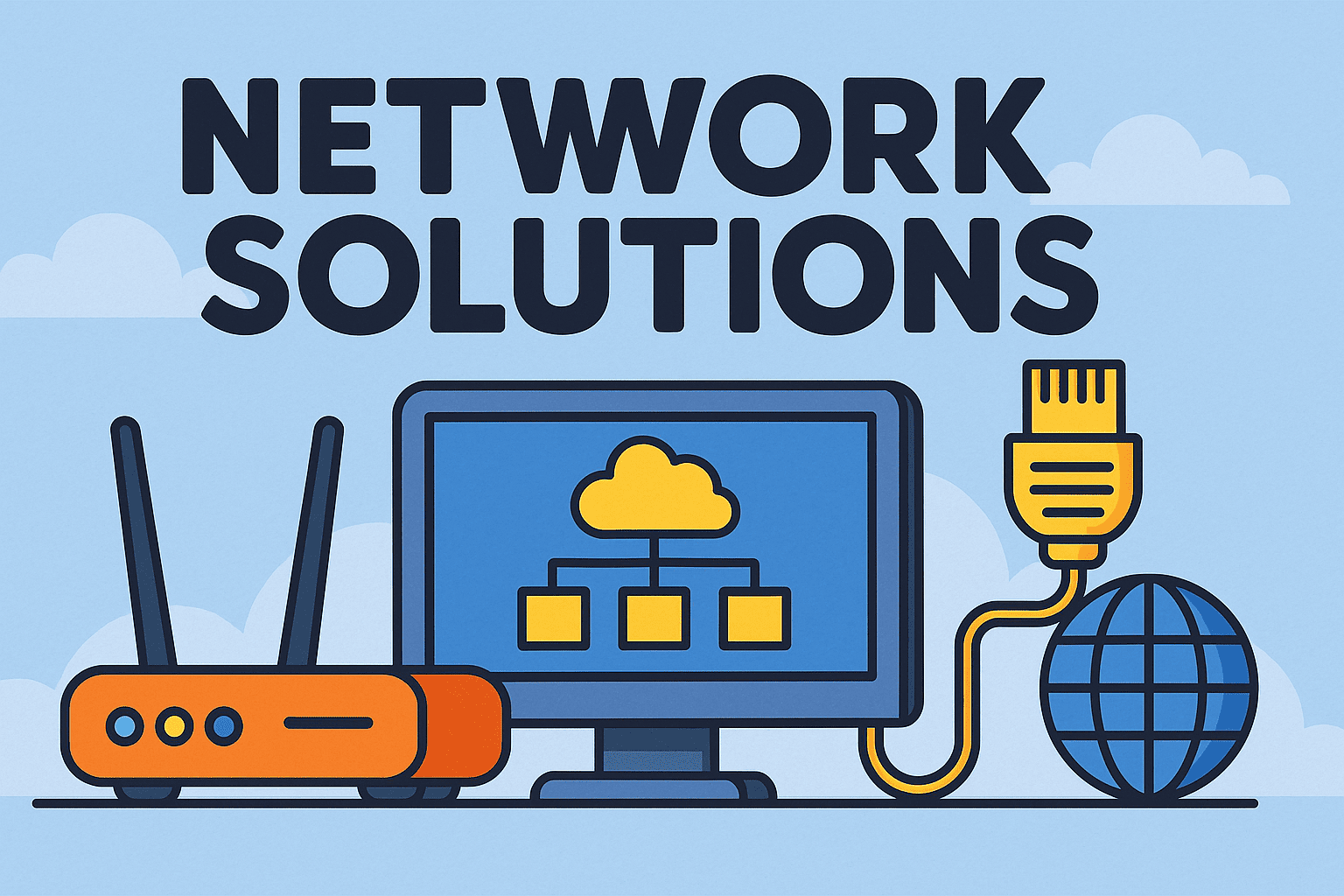Updated on September 29, 2025, by OpenEDR
In today’s digital-first world, connectivity is no longer optional—it’s a business lifeline. Whether you’re running a global enterprise or a growing startup, you’ve likely asked: what network solutions should my business adopt to stay secure and efficient?
Introduction: Why Network Solutions Matter Today
Network solutions refer to the technologies, services, and strategies used to design, manage, and secure an organization’s IT infrastructure. From cloud networking to firewalls and endpoint detection, these solutions ensure businesses stay connected, resilient, and safe against evolving cyber threats.
With cyberattacks increasing by 38% in 2023, robust network solutions have become essential for CEOs, IT managers, and security professionals across industries.
What Are Network Solutions?
Network solutions are a set of tools, systems, and services designed to optimize connectivity, performance, and security across an organization’s IT infrastructure.
They typically include:
Hardware – Routers, switches, servers, and firewalls.
Software – Network management tools, monitoring applications, and security platforms.
Services – Cloud networking, managed IT, and cybersecurity services.
👉 In simple terms: Network solutions ensure that data flows securely, reliably, and efficiently between devices, users, and systems.
Why Businesses Need Network Solutions
To fully understand the value, let’s break down the key benefits:
Stronger Cybersecurity – Protects against malware, phishing, and ransomware.
Improved Productivity – Reliable networks reduce downtime and delays.
Scalability – Easily expand infrastructure as the business grows.
Data Protection & Compliance – Supports GDPR, HIPAA, and PCI DSS requirements.
Cost Efficiency – Optimizes resources through cloud and managed services.
👉 Verdict: Network solutions aren’t just IT investments—they’re business enablers.
Types of Network Solutions
When businesses explore network solutions, they often encounter several categories:
1. Wired and Wireless Networking
Ethernet cabling and Wi-Fi solutions for offices.
Enterprise-grade access points and mesh Wi-Fi systems.
2. Cloud Networking
Hybrid and multi-cloud solutions.
Virtual networks that connect global teams securely.
3. Network Security Solutions
Firewalls, VPNs, and Intrusion Detection/Prevention Systems (IDS/IPS).
Endpoint Detection & Response (EDR) for real-time monitoring.
4. Data Protection & Backup
Disaster recovery solutions.
Cloud-based backup systems.
5. Managed Network Services
Outsourced monitoring, maintenance, and 24/7 support.
Scalable solutions for SMBs and enterprises.
Network Solutions vs Traditional IT
| Feature | Network Solutions (Modern) | Traditional IT Approach |
|---|---|---|
| Security | Proactive, real-time monitoring | Reactive, after-incident fixes |
| Scalability | Cloud-driven, easily scalable | Hardware-limited |
| Cost Model | Subscription & managed services | Large upfront investment |
| Accessibility | Remote-friendly | On-premise only |
| Performance Monitoring | Automated, AI-driven | Manual checks |
👉 Verdict: Modern network solutions provide flexibility, automation, and stronger security compared to traditional IT setups.
The Role of Cybersecurity in Network Solutions
A core part of today’s network solutions is cybersecurity. With threats like phishing, ransomware, and insider attacks, businesses can’t afford weak defenses.
Key cybersecurity measures within network solutions include:
Next-Generation Firewalls (NGFWs) for deep packet inspection.
Zero Trust Architecture – “Never trust, always verify.”
VPNs and Secure Remote Access for distributed teams.
EDR systems to monitor endpoints and respond to suspicious activity.
👉 Example: A financial services firm may use a cloud firewall plus EDR monitoring to secure remote workers while complying with regulations.
Best Practices for Implementing Network Solutions
To maximize ROI and security, IT managers should:
✅ Conduct a full network assessment before deployment.
✅ Implement multi-layered security (firewalls, EDR, MFA).
✅ Use cloud solutions for scalability and disaster recovery.
✅ Train employees on security awareness.
✅ Regularly audit and update systems.
Common Challenges in Network Solutions
Even with strong systems, businesses face hurdles:
Complexity – Managing hybrid environments can be difficult.
Cybersecurity Risks – Attackers constantly evolve tactics.
Downtime – Outages can impact productivity and revenue.
Vendor Lock-In – Relying too heavily on one provider may limit flexibility.
👉 Solution: Use a multi-vendor strategy and integrate network solutions with monitoring tools like OpenEDR for visibility.
Future Trends in Network Solutions
The future of networking is rapidly evolving, driven by emerging technologies:
AI-Powered Networks – Automated threat detection and traffic optimization.
5G Integration – Faster connectivity for mobile and IoT.
SASE (Secure Access Service Edge) – Cloud-native security architecture.
IoT Security Solutions – Protecting billions of connected devices.
Quantum-Safe Encryption – Preparing for future threats.
FAQs: Network Solutions
1. What are examples of network solutions?
Examples include firewalls, cloud networking, VPNs, EDR software, and managed IT services.
2. Do small businesses need advanced network solutions?
Yes. Even SMBs face cyber risks and benefit from scalable, cost-efficient solutions.
3. How do network solutions improve security?
They provide real-time monitoring, firewalls, encryption, and EDR to detect and stop threats.
4. Are cloud-based network solutions safe?
Yes, if combined with strong encryption, compliance measures, and Zero Trust frameworks.
5. How often should networks be updated?
At least quarterly for patches and annually for strategy reviews.
Conclusion: Network Solutions as a Business Imperative
So, what are network solutions? They are the technologies, strategies, and services that ensure businesses stay connected, secure, and scalable. From cloud computing to cybersecurity, modern network solutions are essential for resilience in today’s fast-paced digital economy.
But remember—no single solution is enough. The best approach combines network solutions with layered cybersecurity strategies, including EDR, Zero Trust, and employee training.
👉 Protect your business with advanced endpoint and network security: Register for OpenEDR Free
